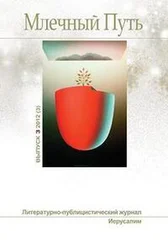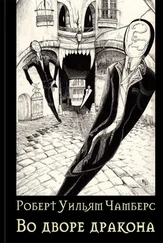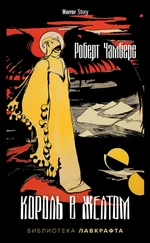Now, not only the crater but its steaming effluvia was utterly unlike anything I had ever before beheld. There was no trace of lava to be seen, or of pumice, ashes, or of volcanic rejecta in any form whatever. There were no sulphuric odours, no pungent fumes, nothing to teach the olfactory nerves what might be the nature of the silvery steam rising from the crater incessantly in a vast circle, ringing its circumference halfway down the slope.
Under this thin curtain of steam a ring of pale yellow flames played and sparkled, completely encircling the slope.
The crater was about half a mile deep; the sides sloped gently to the bottom.
But the odd feature of the entire phenomenon was this: the bottom of the crater seemed to be entirely free from fire and vapour. It was disk–shaped, sandy, and flat, about a quarter of a mile in diameter. Through my field–glasses I could see patches of grass and wild flowers growing in the sand here and there, and the sparkle of water, and a crow or two, feeding and walking about.
I looked at the girl who was standing beside me, then cast a glance around at the very unusual landscape.
We were standing on the summit of a mountain some two thousand feet high, looking into a cup–shaped depression or crater, on the edges of which we stood.
This low, flat–topped mountain, as I say, was grassy and quite treeless, although it rose like a truncated sugar–cone out of a wilderness of trees which stretched for miles below us, north, south, east, and west, bordered on the horizon by towering blue mountains, their distant ranges enclosing the forests as in a vast amphitheatre.
From the centre of this enormous green floor of foliage rose our grassy hill, and it appeared to be the only irregularity which broke the level wilderness as far as the base of the dim blue ranges encircling the horizon.
Except for the log bungalow of Mr. Blythe on the eastern edge of this grassy plateau, there was not a human habitation in sight, nor a trace of man's devastating presence in the wilderness around us.
Again I looked questioningly at the girl beside me and she looked back at me rather seriously.
"Shall we seat ourselves here in the sun?" she asked.
I nodded.
Very gravely we settled down side by side on the thick green grass.
"Now," she said, "I shall tell you why I wrote you to come out here. Shall I?"
"By all means, Miss Blythe."
Sitting cross–legged, she gathered her ankles into her hands, settling herself as snugly on the grass as a bird settles on its nest.
"The phenomena of nature," she said, "have always interested me intensely, not only from the artistic angle but from the scientific point of view.
"It is different with father. He is a painter; he cares only for the artistic aspects of nature. Phenomena of a scientific nature bore him. Also, you may have noticed that he is of a—a slightly impatient disposition."
I had noticed it. He had been anything but civil to me when I arrived the night before, after a five–hundred mile trip on a mule, from the nearest railroad—a journey performed entirely alone and by compass, there being no trail after the first fifty miles.
To characterize Blythe as slightly impatient was letting him down easy. He was a selfish, bad–tempered old pig.
"Yes," I said, answering her, "I did notice a negligible trace of impatience about your father."
She flushed.
"You see I did not inform my father that I had written to you. He doesn't like strangers; he doesn't like scientists. I did not dare tell him that I had asked you to come out here. It was entirely my own idea. I felt that I must write you because I am positive that what is happening in this wilderness is of vital scientific importance."
"How did you get a letter out of this distant and desolate place?" I asked.
"Every two months the storekeeper at Windflower Station sends in a man and a string of mules with staples for us. The man takes our further orders and our letters back to civilization."
I nodded.
"He took my letter to you—among one or two others I sent―"
A charming colour came into her cheeks. She was really extremely pretty. I liked that girl. When a girl blushes when she speaks to a man he immediately accepts her heightened colour as a personal tribute. This is not vanity: it is merely a proper sense of personal worthiness.
She said thoughtfully:
"The mail bag which that man brought to us last week contained a letter which, had I received it earlier, would have made my invitation to you unnecessary. I'm sorry I disturbed you."
" I am not," said I, looking into her beautiful eyes.
I twisted my mustache into two attractive points, shot my cuffs, and glanced at her again, receptively.
She had a far–away expression in her eyes. I straightened my necktie. A man, without being vain, ought to be conscious of his own worth.
"And now," she continued, "I am going to tell you the various reasons why I asked so celebrated a scientist as yourself to come here."
I thanked her for her encomium.
"Ever since my father retired from Boston to purchase this hill and the wilderness surrounding it," she went on, "ever since he came here to live a hermit's life—a life devoted solely to painting landscapes—I also have lived here all alone with him.
"That is three years, now. And from the very beginning—from the very first day of our arrival, somehow or other I was conscious that there was something abnormal about this corner of the world."
She bent forward, lowering her voice a trifle:
"Have you noticed," she asked, "that so many things seem to be circular out here?"
"Circular?" I repeated, surprised.
"Yes. That crater is circular; so is the bottom of it; so is this plateau, and the hill; and the forests surrounding us; and the mountain ranges on the horizon."
"But all this is natural."
"Perhaps. But in those woods, down there, there are, here and there, great circles of crumbling soil— perfect circles a mile in diameter."
"Mounds built by prehistoric man, no doubt."
She shook her head:
"These are not prehistoric mounds."
"Why not?"
"Because they have been freshly made."
"How do you know?"
"The earth is freshly upheaved; great trees, partly uprooted, slant at every angle from the sides of the enormous piles of newly upturned earth; sand and stones are still sliding from the raw ridges."
She leaned nearer and dropped her voice still lower:
"More than that," she said, "my father and I both have seen one of these huge circles in the making !"
"What!" I exclaimed, incredulously.
"It is true. We have seen several. And it enrages father."
"Enrages?"
"Yes, because it upsets the trees where he is painting landscapes, and tilts them in every direction. Which, of course, ruins his picture; and he is obliged to start another, which vexes him dreadfully."
I think I must have gaped at her in sheer astonishment.
"But there is something more singular than that for you to investigate," she said calmly. "Look down at that circle of steam which makes a perfect ring around the bowl of the crater, halfway down. Do you see the flicker of fire under the vapour?"
"Yes."
She leaned so near and spoke in such a low voice that her fragrant breath fell upon my cheek:
"In the fire, under the vapours, there are little animals."
"What!!"
"Little beasts live in the fire—slim, furry creatures, smaller than a weasel. I've seen them peep out of the fire and scurry back into it…. Now are you sorry that I wrote you to come? And will you forgive me for bringing you out here?"
An indescribable excitement seized me, endowing me with a fluency and eloquence unusual:
Читать дальше












